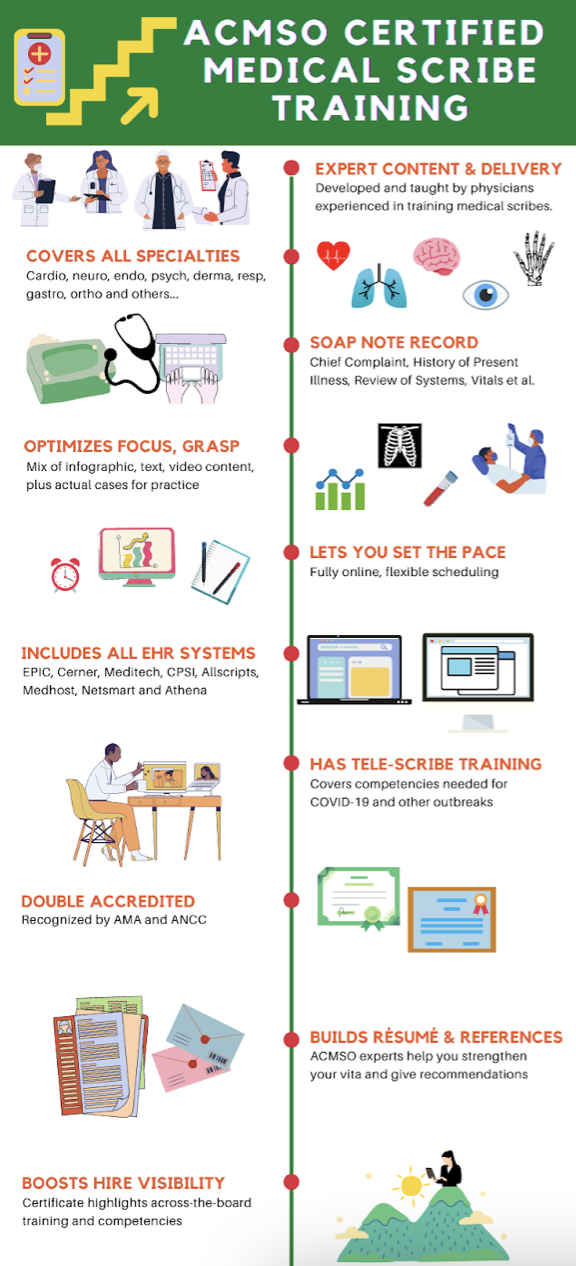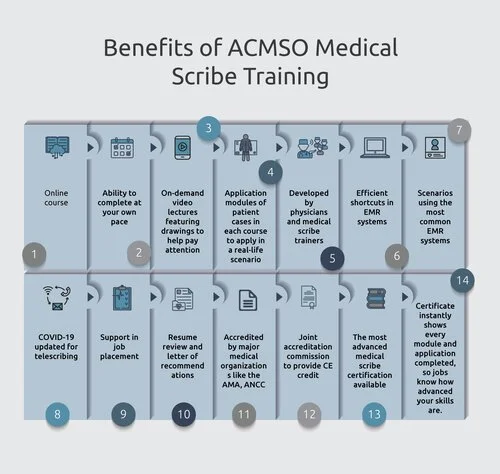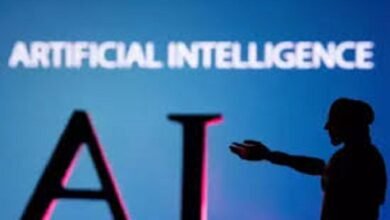Medical Scribe Training: Boost Your Healthcare Career Today

Medical scribe training is essential for those entering the healthcare field. It equips you with necessary skills for accurate documentation.
Medical scribes play a vital role in healthcare settings. They help doctors by handling documentation and clerical tasks. This allows doctors to focus more on patient care. Training to become a medical scribe involves learning medical terminology, understanding electronic health records, and mastering the workflow of a healthcare setting.
Proper training ensures you can effectively support healthcare professionals. This role is increasingly important in improving the efficiency and accuracy of medical documentation. Let’s explore what medical scribe training involves and why it’s a valuable career path.
Introduction To Medical Scribing
Medical scribing is a vital part of the healthcare system. It involves documenting patient interactions during medical visits. A medical scribe works alongside healthcare providers to ensure accurate and timely recording of medical information.
Medical scribing offers a unique blend of healthcare and technology. It provides a strong foundation for those interested in pursuing careers in medicine or healthcare administration.
Role Of A Medical Scribe
A medical scribe’s role is multifaceted. They document patient history, physical exams, and doctor-patient interactions.
- Record medical notes and observations.
- Update patient records with accurate and current information.
- Assist physicians with administrative tasks.
- Enter data into electronic health records (EHR) systems.
Medical scribes are essential in maintaining the flow of clinical operations. They help reduce the burden of documentation on healthcare providers.
Importance In Healthcare
The importance of medical scribes in healthcare cannot be overstated. They help improve the efficiency and accuracy of medical documentation.
Here are some key benefits:
| Benefit | Description |
|---|---|
| Enhanced Patient Care | Doctors spend more time with patients and less on paperwork. |
| Increased Efficiency | Medical scribes streamline the documentation process. |
| Accurate Records | Medical scribes ensure precise and up-to-date patient records. |
| Reduced Physician Burnout | Less administrative work helps reduce stress on doctors. |
Medical scribes contribute significantly to a well-functioning healthcare system. They play a crucial role in enhancing the quality of care and operational efficiency.
Skills Required
Medical scribe training is essential for efficient healthcare documentation. Aspiring scribes need a variety of skills to excel. These skills ensure accurate and effective support for healthcare providers.
Communication Skills
Effective communication is crucial. Medical scribes interact with doctors and patients. They must listen carefully and convey information clearly. Good communication prevents misunderstandings and errors. Scribes also need to understand medical terminology.
Attention To Detail
Attention to detail is vital for medical scribes. They document patient information accurately. Even small errors can have serious consequences. Scribes must double-check their work. They should ensure every detail is correct. This skill helps maintain the integrity of medical records.
Training Programs
Medical Scribe Training Programs are essential for those entering the field. These programs equip students with the skills needed to assist healthcare providers. They also help with patient documentation and other essential tasks. There are various training options available, including online courses and in-person training. Each has its own benefits and unique features.
Online Courses
Online courses offer flexibility and convenience. Students can learn at their own pace. These courses often include video lectures, quizzes, and interactive assignments. Many platforms provide certification upon completion. This mode of learning is perfect for those with busy schedules. It allows you to balance work, life, and education.
In-person Training
In-person training offers hands-on experience. Students can interact directly with instructors and peers. This method provides immediate feedback and support. Practical sessions in real medical settings enhance learning. In-person training fosters a deeper understanding of medical documentation. It also helps build strong communication skills. This type of training is ideal for those who prefer face-to-face learning.
Certification And Accreditation
Certification and Accreditation are vital in the field of medical scribe training. They ensure that the training programs meet specific standards. This guarantees that aspiring medical scribes receive quality education. Understanding the importance of certification and accreditation helps you make informed decisions about your training.
Certification Bodies
Several organizations provide certification for medical scribes. These bodies set the standards for education and practice. Here are some of the main certification bodies:
- The American College of Medical Scribe Specialists (ACMSS): Offers the Certified Medical Scribe Specialist (CMSS) credential.
- The American Healthcare Documentation Professionals Group (AHDPG): Provides the Certified Medical Scribe Professional (CMSP) designation.
- The Clinical Documentation Certification Council (CDCC): Grants the Clinical Documentation Specialist (CDS) certification.
Each of these bodies has its own requirements and standards. Be sure to research which certification best fits your career goals.
Accreditation Importance
Accreditation is a process where an external body evaluates the training program. This ensures the program meets certain standards of quality. Here are some reasons why accreditation is important:
| Reason | Explanation |
|---|---|
| Quality Education | Accredited programs adhere to high standards of teaching. |
| Employer Preference | Employers often prefer candidates from accredited programs. |
| Professional Recognition | Accreditation adds value to your credentials in the job market. |
Choosing an accredited program ensures you receive the best training. This can make a significant difference in your career as a medical scribe.
Job Opportunities
Medical scribe training opens doors to many job opportunities. Trained medical scribes are in high demand. They help healthcare providers with documentation and administrative tasks. This role is crucial in various healthcare settings.
Hospitals
Hospitals are one of the main employers of medical scribes. In busy hospital environments, doctors need to focus on patient care. Medical scribes assist them by managing patient records and notes. This makes hospital operations smoother and more efficient. Scribes work in emergency rooms, operating rooms, and outpatient clinics.
In these settings, scribes document patient interactions in real time. They also help with coding for billing purposes. This ensures that patient records are accurate and up-to-date. Hospitals value this skill set. It helps improve patient care and workflow efficiency.
Private Practices
Medical scribes also find job opportunities in private practices. Doctors in private practices often have limited administrative support. Scribes take on the documentation burden, allowing doctors more time with patients. They manage electronic health records (EHR) and handle clerical tasks.
This role is essential in specialty clinics, such as dermatology or cardiology. Scribes help with detailed medical histories and treatment plans. Their work ensures that private practices run smoothly. It enhances the quality of patient care and satisfaction.

Credit: acmso.org
Career Advancement
Medical Scribe Training opens doors to career advancement in the healthcare field. It equips individuals with essential skills for success. This training can lead to better job opportunities and higher earning potential.
Medical scribe training can open many doors. This career path offers various opportunities for growth and development. Many individuals start as medical scribes and progress to higher roles. Let’s explore these avenues.
Specialization Options
Specialization can lead to exciting career advancements. Medical scribes can focus on specific fields. For example, some may specialize in cardiology. Others might choose dermatology or emergency medicine. Specialized scribes often gain deeper knowledge. They become valuable team members in their chosen fields. This expertise can lead to higher pay and job satisfaction.
Leadership Roles
Leadership roles offer another path for career growth. Experienced scribes can move into supervisory positions. They may manage teams of scribes. Leadership roles require strong organizational skills. Communication is also key. Effective leaders ensure smooth operations. They help maintain high standards of documentation. Leadership roles can be fulfilling. They provide a sense of achievement and responsibility. “`
Challenges In Medical Scribing
Medical scribing involves documenting patient encounters in real-time. This task is crucial but comes with its own set of challenges. Understanding these challenges helps in preparing for a rewarding career in medical scribing.
Common Challenges
Medical scribes face several challenges daily. Let’s explore some common issues:
- High Pressure Environment: Scribes work in fast-paced settings, often under tight deadlines.
- Complex Medical Terminology: Understanding and documenting medical jargon is essential but difficult.
- Accuracy and Attention to Detail: Mistakes can lead to serious consequences for patient care.
- Constant Learning: Medical knowledge is always evolving, requiring continuous education.
- Interpersonal Skills: Effective communication with doctors and patients is vital.
Overcoming Challenges
Overcoming these challenges is key to being an effective medical scribe. Here are some strategies:
| Challenge | Strategy |
|---|---|
| High Pressure Environment | Practice time management and stay organized. |
| Complex Medical Terminology | Use medical dictionaries and take detailed notes. |
| Accuracy and Attention to Detail | Double-check your work and stay focused. |
| Constant Learning | Attend workshops and read medical journals. |
| Interpersonal Skills | Practice active listening and clear communication. |
With dedication and the right strategies, medical scribes can overcome these challenges. This ensures a smooth workflow and high-quality patient care.

Credit: acmso.org
Benefits Of Being A Medical Scribe
Being a medical scribe offers numerous benefits. This role provides a unique opportunity to gain valuable skills and experience in the medical field. It is an excellent stepping stone for those pursuing a career in healthcare.
Professional Growth
As a medical scribe, you will develop a deep understanding of medical terminology. You will also learn about different medical conditions and treatments. This knowledge can be incredibly valuable in your future career.
Working closely with healthcare professionals allows you to observe their interactions with patients. You will see how they diagnose and treat various ailments. This experience can help you develop your own professional skills.
Hands-on Experience
Medical scribes work directly with doctors and nurses. You will be present during patient exams and document their findings. This hands-on experience is invaluable for anyone considering a career in medicine.
By working in a real clinical environment, you will gain practical skills that cannot be learned in a classroom. This experience will make you a more competitive candidate for future job opportunities.
Additionally, you will become proficient in using electronic health records (EHR) systems. This is a critical skill in today’s healthcare industry.
Future Of Medical Scribing
The future of medical scribing is evolving rapidly. Technology is transforming how medical scribes work. Their roles are becoming more dynamic and essential in healthcare settings. Here’s a closer look at what lies ahead.
Technological Advancements
New technologies are shaping the medical scribe field. Artificial intelligence (AI) tools help scribes document patient visits more accurately. Voice recognition software is also improving. This software allows scribes to transcribe medical notes faster and with fewer errors.
Telemedicine is growing. Medical scribes are now assisting in virtual consultations. They ensure accurate documentation of patient interactions. This shift requires scribes to adapt quickly to new tools and platforms.
Below is a table showing some emerging technologies in medical scribing:
| Technology | Impact |
|---|---|
| AI-powered transcription | Reduces errors, saves time |
| Voice recognition software | Enhances accuracy and speed |
| Telemedicine platforms | Expands scribing roles to virtual settings |
Evolving Roles
Medical scribes are taking on more responsibilities. They are not just documenting patient visits. They are also assisting with administrative tasks. This includes scheduling appointments and managing patient records.
Scribes are now part of the patient care team. They work closely with doctors and nurses. Their input is valuable in creating efficient workflows. This helps in providing better patient care.
Here are some new roles medical scribes are embracing:
- Assisting with electronic health records (EHR) management
- Supporting telehealth consultations
- Helping with patient follow-up and education
The future of medical scribing is promising. Technology and evolving roles are making scribes more integral to healthcare teams.

Credit: acmso.org
Frequently Asked Questions
What Is A Medical Scribe?
A medical scribe is a professional who assists healthcare providers by documenting patient encounters in real-time. They help in maintaining accurate medical records.
Why Is Medical Scribe Training Important?
Medical scribe training is crucial for ensuring accuracy in patient documentation. It helps scribes understand medical terminology, procedures, and legal aspects.
How Long Is Medical Scribe Training?
Medical scribe training typically lasts between 2 to 6 weeks. The duration depends on the training program and the complexity of the role.
What Skills Are Needed For A Medical Scribe?
Key skills for a medical scribe include strong typing ability, attention to detail, and knowledge of medical terminology. Good communication skills are also essential.
Conclusion
Medical scribe training offers many benefits. It improves job opportunities and skills. The demand for medical scribes is growing. This field provides a stable career path. By completing training, you gain valuable experience. It helps you understand medical terms better.
You also learn to assist doctors efficiently. Start your training now. Build a rewarding career in healthcare.





